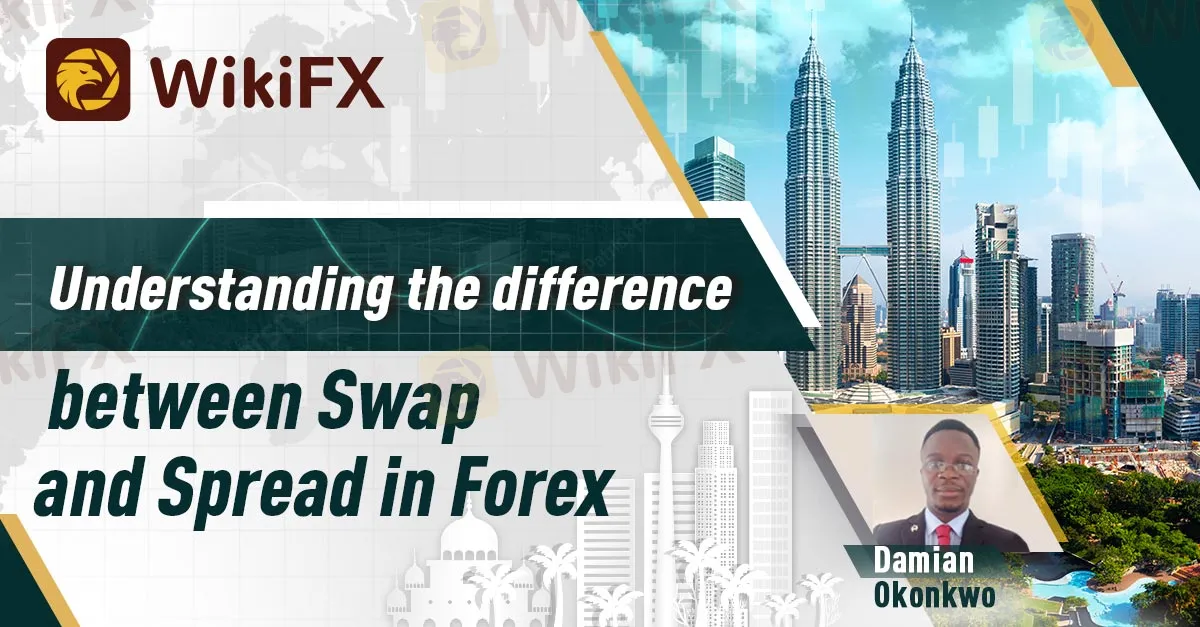简体中文
繁體中文
English
Pусский
日本語
ภาษาไทย
Tiếng Việt
Bahasa Indonesia
Español
हिन्दी
Filippiiniläinen
Français
Deutsch
Português
Türkçe
한국어
العربية
Understanding the difference between Swap and Spread in Forex
Abstract:Spread and swap generally reduce the trader's profits and available margin for trading. Only on a few occasions does the swap come as positive. The spread refers to the broker's commission for services rendered while the swap refers to the cost of holding overnight positions in the market.

By: Damian Okonkwo
What is spread?
The term spread used in forex refers to the difference between the broker's offering prices and the actual market price of the financial instrument they offer to their clients. Spread is the extra costs added to the prices of various financial instruments traded in the market by the broker while offering it to their clients which serves as his commission for services rendered. We can further define spreads as the difference between the bid and ask prices of the various financial instruments traded in the forex market today.
What is swap?
Swap is the cost of holding overnight positions in the market. Usually, some brokers place an additional cost on the trader's position when he leaves his position open at the close of each market day. The swap charges could be positive or negative depending on the interest rate for the currency pair traded.
Major difference between Swap and Spread
| Swap | Spread |
| Cost for overnight positions | Broker's commission for each position taken. |
| Could be positive or negative | Always negative |
| Depends on the interest rate of the pair traded | Depends on the type of instrument traded |
| Keeps increasing based on the number of days the position is held. | Charged once when the position is opened |
How do swaps and spreads affect the trader's position in forex?
Generally, both the spread and swap affect the trader's position negatively. Only on a few occasions does the swap come as positive. Aside from these rare occasions, both the spread and swap are known to reduce the trader's profits and available margin for trading.

Disclaimer:
The views in this article only represent the author's personal views, and do not constitute investment advice on this platform. This platform does not guarantee the accuracy, completeness and timeliness of the information in the article, and will not be liable for any loss caused by the use of or reliance on the information in the article.
Read more

CySEC Revokes UFX Broker Licence as Reliantco Halts Global Operations
The Cyprus Securities and Exchange Commission (CySEC) has officially withdrawn the Cyprus Investment Firm (CIF) licence of Reliantco Investment Limited, the operator of UFX.com. This decision followed a six-month period during which the company failed to provide any investment services or perform investment activities.

Elon Musk Sparks Debate Over Presidential Power and Federal Reserve Independence
Elon Musk has voiced his support for the controversial idea that United States presidents should have a role in shaping Federal Reserve policies. This endorsement aligns with recent remarks from President-elect Donald Trump, who has hinted at revisiting the central bank's independence, a long-held tradition in the nation's financial governance.

Crypto 101: Coins vs Tokens
For those new to the world of cryptocurrency, terms like "coin" and "token" may seem interchangeable. However, understanding the distinction between these two digital assets is crucial for navigating the crypto landscape. Both coins and tokens serve as integral components of blockchain ecosystems, yet they differ in their functionalities, use cases, and the technologies underpinning them.

WikiEXPO Global Expert Interview: The Future of Financial Regulation and Compliance
In the current era of booming financial technology, constantly evolving regulatory environment, and global construction of secure trading defenses, "Seeing Diversity, Trading Safely" - the theme of the WikiEXPO Dubai exhibition on November 27th accurately captures the core concerns of the industry.
WikiFX Broker
Latest News
BSP Shuts Down Uno Forex Over Serious AML Violations
ACY Securities Expands Global Footprint with South Africa Acquisition
Tokyo Police Arrest 4 for Unregistered FX Trading Scheme
Rupee gains against Euro
WikiEXPO Global Expert Interview: The Future of Financial Regulation and Compliance
DFSA Warns of Fake Loan Approval Scam Using Its Logo
Consob Sounds Alarm: WhatsApp & Telegram Users Vulnerable to Investment Scams
CySEC Revokes UFX Broker Licence as Reliantco Halts Global Operations
Axi Bids AUD 52M to Acquire Low-Cost Broker SelfWealth, Outbidding Competitor Bell Financial
Crypto Influencer's Body Found Months After Kidnapping
Currency Calculator


